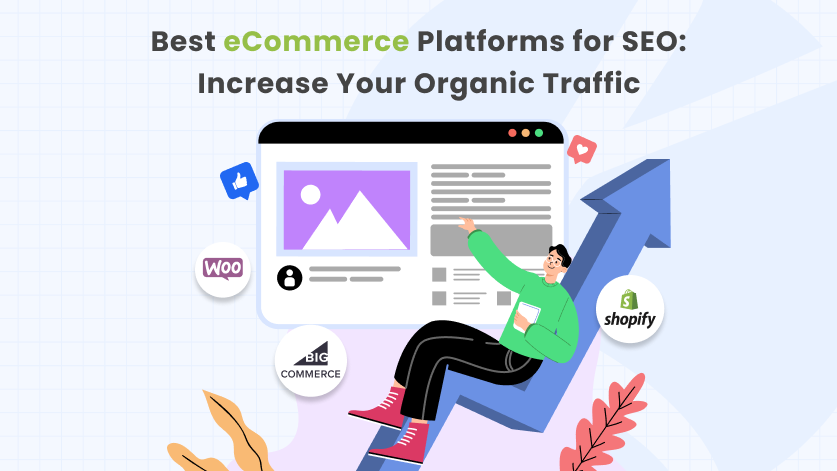In searching for the best eCommerce platforms for SEO, it is important to understand the power of eCommerce in today’s digital world. eCommerce has transformed both business operations and consumer behavior. eCommerce SEO ensures that online stores stand out on the search engine result pages.
Given the various options, each platform offers a unique set of SEO capabilities. Choosing the right one is critical; a mistake can make your store invisible in the digital world, resulting in lost traffic and sales.
This guide helps you decide on the best eCommerce platform for SEO in 2024 and outlines, its pros and cons to help you make an informed decision.
Let’s get started on the road to eCommerce SEO success!
What Makes an eCommerce Platform SEO-Friendly?
When it comes to selecting the best eCommerce platform for your online store, it’s crucial to consider its SEO-friendliness. Search engine optimization (SEO) is a fundamental aspect of digital marketing and can significantly impact your eCommerce site’s success.
An SEO-friendly eCommerce platform plays a pivotal role in helping your online store rank higher in search engine results and consequently increase organic traffic.
Factors to Consider When Choosing an eCommerce Platform for SEO:
1. Mobile Responsiveness: More and more people are using their smartphones and tablets to shop online. Hence, it is important to choose a mobile-friendly eCommerce platform. This means that your website must look good and work well on all devices, so responsive design is critical to the success of an eCommerce store.
2. Site Speed: Search engines prefer websites that load quickly. An SEO-friendly eCommerce platform should have features that help you improve your website’s loading times, such as caching and image optimization.
3. Customizable URLs and Meta Descriptions: Your product and category pages should have unique and descriptive URLs and meta descriptions. This will help search engines understand what your pages are about and rank them accordingly.
4. Image Optimization: Search engines can also index images, so it is important to optimize your product images for SEO. This includes using relevant keywords in the file names and alt text.
5. SEO Plugins and Apps: Many eCommerce platforms offer SEO plugins or apps that improve efficiency. Consider whether your eCommerce platform allows you to use popular SEO plugins and apps for your online store.
By considering these factors, you can choose an eCommerce platform that is SEO-friendly, providing a strong foundation for improving your site’s search engine rankings and increasing organic traffic.
Let’s take a look at the Best eCommerce Platform for SEO:
1. WooCommerce:
WooCommerce, a WordPress plugin, offers unparalleled flexibility and customization. It provides a vast range of SEO plugins, making it one of the best eCommerce platforms for SEO. With WooCommerce, you can optimize product descriptions, meta titles, and more.
Pricing: While WooCommerce is free, associated expenses can arise from hosting (starting at $6.95/month) and domain registration (around $15/year). For bespoke pricing or unique needs, reaching out to WooCommerce experts is advised.
WooCommerce SEO Strengths:
WooCommerce, a widely used eCommerce platform, offers several SEO strengths that can help you enhance your online store’s visibility and organic traffic.
Here are some of the key SEO strengths of WooCommerce:
1. Clean and Simple Website Structure: WooCommerce is built on WordPress, which is known for its clean and simple website structure. This makes it easy for search engines to crawl and index your website.
2. Fast Loading Times: WooCommerce is a lightweight platform that is designed to load quickly. This is important for SEO, as search engines prefer websites that load quickly.
3. Customization: WooCommerce is highly customizable. You can tailor your website’s design and functionality to match your brand’s identity, which is crucial for SEO. A unique and user-friendly website is more likely to attract and retain visitors.
4. Content Management: WooCommerce allows you to manage and publish content, such as blog posts and articles, alongside your products. Regularly updating your content with high-quality, relevant, and unique articles can significantly boost your SEO efforts.
5. Clean Permalinks: WooCommerce generates clean and customizable permalinks, making it easy to create SEO-friendly URLs for your product and category pages. This is essential for both user experience and search engine optimization.
In addition to the above strengths, WooCommerce also offers a wide range of plugins and extensions that can help you to improve your website’s SEO. For example, there are plugins for generating sitemaps, optimizing your product pages for specific keywords, and optimizing images for your online store.
Overall, WooCommerce is a very SEO-friendly eCommerce platform. It offers a number of features and functionality that can help you to improve your website’s ranking in search results and attract more organic traffic.
Potential Drawbacks of using WooCommerce:
WooCommerce is a popular eCommerce platform for SEO, but like any software, it has its potential drawbacks. Understanding these drawbacks is crucial when deciding whether the WooCommerce platform is the right choice for your online store.
Here are some of the potential drawbacks of using WooCommerce:
- Complexity: WooCommerce is a powerful platform, but it can be complex to set up and configure, especially for beginners.
- Security: WooCommerce is a popular platform, so it is a target for hackers. It is important to take steps to secure your WooCommerce website, such as installing security plugins and keeping your software up to date.
- Cost: WooCommerce itself is free to use, but there are other costs to consider, such as hosting, domain registration, premium themes and plugins, and payment gateway fees.
- Scalability: WooCommerce is best suited for beginners and small-sized businesses. If you have a large business or expect your business to grow rapidly, you may need to consider a more scalable eCommerce platform.
- Limited Customer Support: As WooCommerce is an open-source platform, the company does not provide customer support. However, there is a large community of WooCommerce users and developers who can provide support.
- Plugin Compatibility: Some third-party plugins and themes may not be fully compatible with WooCommerce, which could lead to compatibility issues and require custom development work to resolve.
Overall, WooCommerce is a great eCommerce platform for beginners and small-sized businesses. However, it is important to be aware of the potential drawbacks before choosing WooCommerce for your online store.
If you are considering using WooCommerce, I recommend that do your own research what are the pros and cons and more. You may also want to consult with a WooCommerce expert to help you set up and configure your store.
2. Shopify:
Shopify stands out as one of the best SEO eCommerce platforms for its user-friendly interface and extensive features. It’s a go-to for all-sized business owners, and it’s easy to integrate with third-party Shopify apps.
Pricing: Shopify’s pricing starts at $29/month and goes up to $299/month. There’s also a tailored “Shopify Plus” for enterprise needs. It’s vital to select a plan that suits your needs and budget.
Shopify SEO Strengths:
Shopify is a popular eCommerce platform that offers several SEO strengths to help you enhance your online store’s visibility and organic traffic.
Here are some of the key SEO strengths of Shopify:
1. Mobile Responsiveness: Shopify’s themes are mobile responsive by default. This is critical for SEO, as search engines prioritize mobile-friendly websites in their rankings. A responsive design ensures that your site performs well on both desktop and mobile devices.
2. Fast Page Loading Speed: Shopify is known for its fast page loading times, which is a crucial factor for SEO. Speedy websites provide a better user experience and are more likely to rank higher in search results.
3. Built-in SEO Features: Shopify includes a range of built-in SEO features, such as customizable meta tags, title tags, and header tags (H1, H2, etc.). These features enable you to optimize your Shopify store for search engines without the need for third-party plugins.
4. SSL Security: Shopify provides free SSL certificates for all stores. This is important for SEO, as it shows search engines that your website is secure.
5. Shopify App Store: Shopify’s extensive app store offers numerous SEO-related apps and plugins that can enhance your SEO efforts. This flexibility allows you to tailor your SEO strategy to your specific needs.
Learn more in our detailed guide on the best Shopify apps.
Potential Drawbacks of using Shopify:
Shopify is a popular eCommerce platform that offers a range of features and benefits, but it also has some potential drawbacks to consider when deciding whether it’s the right choice for your online store.
Here are some of the potential drawbacks of using Shopify:
- Costs: While Shopify offers various pricing plans, it’s not entirely free. The monthly subscription costs, transaction fees for using third-party payment gateways, and the cost of premium themes and apps can add up, especially for beginners and small-sized businesses.
- Limited Customization: While Shopify provides a good level of customization, it may not be as flexible as some other platforms. Making extensive design and functionality changes might require coding knowledge or the assistance of a developer.
- Transaction Fees: If you don’t use Shopify Payments (their own payment gateway), you’ll incur additional transaction fees for each sale, which can burn your profit margins.
- Third-Party App Costs: While the Shopify App Store offers a wide range of apps to extend functionality, many of these apps come with their own costs, potentially increasing your monthly expenses.
- SEO Limitations: While Shopify provides a solid foundation for SEO, it might not offer the same level of in-depth SEO customization and control as some other platforms. Advanced SEO features are available but may require additional apps or development work.
- Platform Lock-In: Once you’ve invested in building your store on Shopify, it can be challenging to switch to another platform without significant disruption and potential SEO and data migration issues.
- Limited Blogging Features: While Shopify allows you to add a blog to your site, it’s not as robust as dedicated blogging platforms like WooCommerce. If content marketing is a central part of your strategy, you might find it somewhat limited.
- Bandwidth Limits: Depending on your chosen plan, Shopify may impose bandwidth limits. If your store experiences high traffic, you might face additional costs or limitations on your website’s performance.
- Dependency on Shopify’s Servers: Your store’s performance and uptime are dependent on Shopify’s servers. If they experience technical issues or downtime, it can affect your business.
Overall, Shopify is a great eCommerce platform with many advantages. However, it is important to be aware of the potential drawbacks before choosing Shopify for your online store.
If you are choosing Shopify for your online business please consider the above factors. Your decision should align with your specific business needs and budget.
3. BigCommerce:
BigCommerce, a SaaS-based eCommerce platform for SEO established in 2009, is versatile, catering to businesses ranging from small startups to extensive enterprises. With its emphasis on scalability and a broad range of features, it stands out as a prominent choice for online selling.
Pricing:
- Standard Plan: $39/month.
- Plus Plan: $105/month.
- Pro Plan: $399/month.
BigCommerce SEO Strengths:
BigCommerce is another eCommerce platform known for its robust features and SEO capabilities.
Here are some of the key SEO strengths of BigCommerce:
1. Mobile Responsiveness: BigCommerce themes are designed to be mobile-responsive, ensuring that your website functions well on mobile devices. This aligns with search engines’ preference for mobile-friendly websites and can positively impact your SEO.
2. SSL Security: Security is a ranking factor for search engines. BigCommerce provides SSL certificates for all its stores, ensuring a secure shopping experience for your customers, which can enhance your SEO.
3. Built-in SEO Features: BigCommerce includes a wide range of built-in SEO features, such as customizable meta titles, descriptions, and header tags (H1, H2, etc.). This simplifies the process of optimizing your website for search engines without the need for third-party plugins.
4. Blog Integration: Content is crucial for SEO, and BigCommerce makes it easy to integrate a blog into your store. Regularly publishing high-quality, relevant, and unique content can significantly boost your SEO efforts.
5. App Store: BigCommerce offers an app store with a variety of SEO-related apps and plugins that can improve your SEO efforts. This flexibility enables you to tailor your SEO strategy to your specific needs.
6. Microdata: BigCommerce has built-in microdata for your product pages. This helps search engines to better understand your content and display it in rich snippets in SERPs.
In addition to the above strengths, BigCommerce also offers a wide range of integrations and apps that can help you to improve your website’s SEO. For example, there are integrations and apps for generating sitemaps, optimizing your product pages for specific keywords, and building backlinks to your website.
Potential Drawbacks of Using BigCommerce:
While BigCommerce is a powerful eCommerce platform with numerous advantages, it also has some potential drawbacks to consider when evaluating it as a solution for your online store.
Here are some of the potential drawbacks of using BigCommerce:
- Cost: BigCommerce is more expensive than some other eCommerce platforms, such as Shopify and WooCommerce. However, it offers more features and functionality, which may be worth the extra cost for some businesses.
- Complexity: BigCommerce can be complex to set up and configure, especially for beginners. If you are not familiar with eCommerce, you may want to consider hiring a BigCommerce developer to help you set up your store.
- Transaction Fees: BigCommerce charges a transaction fee on all sales, which can range from 0.5% to 2.5%, depending on your plan. This can add up, especially if you have a high volume of sales.
- Limited Design Customization: BigCommerce offers a wide range of themes, but the design customization options are limited. If you need a highly customized website, you may need to hire a BigCommerce developer.
- Reliance on Third-Party Apps: BigCommerce offers a wide range of apps, but many of them are paid. If you need to use a lot of apps, this can add up to a significant monthly cost.
- App Quality: Not all BigCommerce apps are created equal. Some apps may be poorly coded or buggy, which can cause problems on your website.
- Multilingual Support: While BigCommerce allows you to set up a multi-language store, doing so might require additional apps or manual work and might not be as seamless as with some other platforms.
Additional Tips for Maximizing SEO on Your Chosen SEO eCommerce Platforms:
Maximizing SEO on your chosen eCommerce platform is crucial for attracting organic traffic and driving sales. Here are some additional tips to help you get the most out of your platform’s SEO capabilities:
- Conduct Regular Keyword Research: SEO is constantly evolving, so it’s important to regularly conduct keyword research to identify the most relevant and profitable keywords for your eCommerce store. You can use tools like Google Keyword Planner and SEMrush to help you with this.
- Optimize Your Product Pages: Product pages are one of the most important pages on your eCommerce website, so it’s important to optimize them for SEO. This includes using relevant keywords in the title, meta description, and product description. You should also use high-quality images and videos to make your product pages more engaging.
- Create High-Quality Content: Content is king when it comes to SEO, so it’s important to create high-quality content that is relevant to your target audience and optimized for search engines. This could include blog posts, product reviews, and educational guides.
- Use Technical SEO Best Practices: Technical SEO refers to the behind-the-scenes aspects of your website that can affect your ranking in search engines. This includes things like your website’s speed, mobile-friendliness, and sitemap.
- Use Structured Data: Structured data is a way to markup your website’s content so that search engines can better understand it. This can help your website appear in rich snippets in search results, which can lead to more clicks.
- Optimize Your Category Pages: Category pages are another important type of page on your eCommerce website. Be sure to optimize them for SEO by using relevant keywords in the title, meta description, and category description. You should also include internal links to your product pages.
- Use Product Reviews: Product reviews are a great way to improve your SEO and increase sales. Be sure to encourage your customers to leave reviews on your website.
- Promote Your eCommerce Website on Social Media: Social media is a great way to promote your eCommerce website and build backlinks. Be sure to share your content on social media and engage with your followers.
Learn more about social media for eCommerce stores.
You can improve your website’s ranking in search results and maximize your SEO efforts on eCommerce platforms by following these tips. This will increase your sales and organic traffic on your eCommerce sites.
Conclusion:
In conclusion, selecting the best eCommerce platform for SEO is a crucial decision in your journey toward online success. As the digital landscape continues to evolve, the importance of organic traffic cannot be overstated. Your choice of platform can grow your online store to new heights.
We’ve explored the top 3 best eCommerce platforms for SEO – WooCommerce, Shopify, and BigCommerce – each platform offers a unique set of strengths and drawbacks.
While WooCommerce, with its WordPress integration, caters to those who value customization and content management, Shopify shines with its user-friendly interface and mobile responsiveness. On the other hand, BigCommerce stands out for its scalability and in-depth SEO features.
Remember that no platform is a one-size-fits-all solution. Your decision should align with your specific business needs, budget, and your comfort level with customization and complexity.
Whichever platform you choose, the common thread in eCommerce SEO success lies in understanding the factors that contribute to higher search engine rankings.
Mobile responsiveness, fast loading times, customizable URLs, and meta descriptions, image optimization, and the use of SEO plugins and apps are all critical elements in your SEO strategy. Regular keyword research, high-quality content creation, and constancy to technical SEO best practices will further improve your online visibility.
As you go ahead on your eCommerce SEO journey in 2024, consider these key factors, and carefully understand the pros and cons of each platform.
Your online store has the potential to reach greater heights than ever before, and with the best eCommerce platforms for SEO you can increase organic traffic, and ultimately, greater online prosperity.
So, choose wisely, implement best practices, and see your eCommerce SEO success in the dynamic world of online retail.
For your SEO strategy, which eCommerce platform do you use? Comment below!








